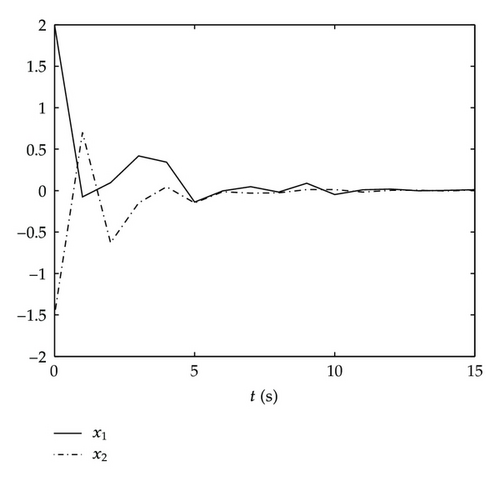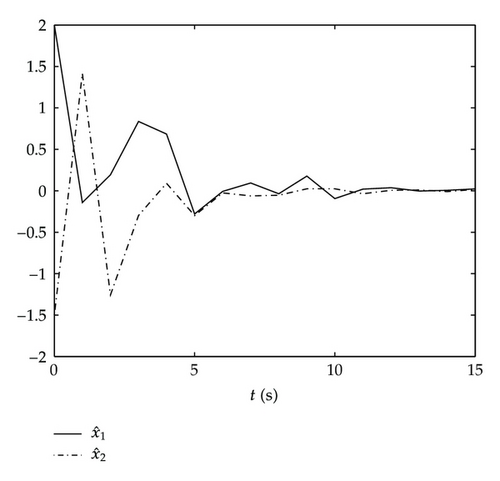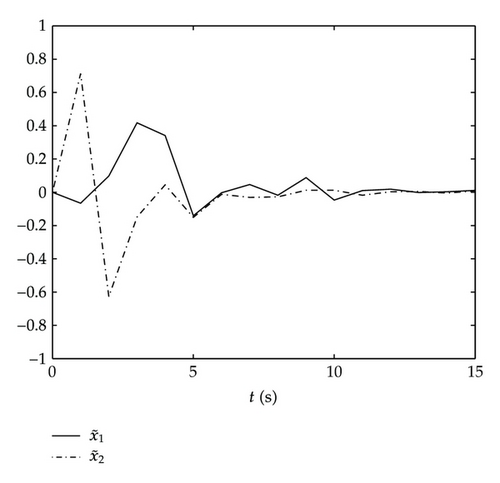Robust H∞ Filtering for Uncertain Discrete-Time Fuzzy Stochastic Systems with Sensor Nonlinearities and Time-Varying Delay
Abstract
The robust filtering problem for a class of uncertain discrete-time fuzzy stochastic systems with sensor nonlinearities and time-varying delay is investigated. The parameter uncertainties are assumed to be time varying norm bounded in both the state and measurement equations. By using the Lyapunov stability theory and some new relaxed techniques, sufficient conditions are proposed to guarantee the robustly stochastic stability with a prescribed H∞ performance level of the filtering error system for all admissible uncertainties, sensor nonlinearities, and time-varying delays. These conditions are dependent on the lower and upper bounds of the time-varying delays and are obtained in terms of a linear matrix inequality (LMI). Finally, two simulation examples are provided to illustrate the effectiveness of the proposed methods.
1. Introduction
Fuzzy systems in the Takagi-Sugeno (T-S) model can represent a lot of complex nonlinear systems in [1–3]. By using a T-S fuzzy plant model, one can describe a nonlinear system as a weighted sum of some simple linear subsystems. This fuzzy model is described by a family of fuzzy if-then rules that represent local linear input/output relations of the system. The overall fuzzy model of the system is achieved by smoothly blending these local linear models together through membership functions. Consequently, stability, control, and filtering problems for T-S fuzzy systems have attracted considerable attention, and many important results have been reported in [4–9].
It has been known that time delays are one of the main causes of instability and poor performance of control systems in [10]. Analysis and synthesis of such systems are of both theoretical and practical importance. Therefore, the study of time-delay systems has attracted great attention over the past few years in [11, 12]. For continuous-time systems, the obtained results can be generally classified into two types: delay-independent and delay-dependent ones. It has been understood that the latter is generally less conservative since the size of delays is considered, especially when time delays are small. Compared with continuous-time systems with time-varying delays, the discrete-time counterpart receives relatively less attention. See, for example, [13–16] and references therein.
In the past few years, much research effort has been paid to the control and filtering problems for nonlinear systems that have been widely applied in many fields such as communication network, image processing, and mobile robot localization [17, 18]. And the filtering for nonlinear stochastic systems has been of great interest since stochastic modeling has come to play an important role in many branches of engineering applications [19–22]. particularly for discrete-time stochastic systems, so far, a number of important results have been reported for linear discrete-time stochastic systems. The exponential filtering problem is studied for discrete time-delay stochastic systems with Markovian jump parameters and missing measurements in [23]. The robust fault detection filter problem for fuzzy stochastic systems is studied in [24]. The problem of robust H∞ filtering for uncertain discrete-time stochastic systems with time-varying delays is considered in [25]. For nonlinear discrete-time stochastic systems, the filtering problem for a class of nonlinear discrete-time stochastic systems with state delays is considered in [26]. The robust H∞ filtering problem for a class of nonlinear discrete time-delay stochastic systems is considered in [27]. The H∞ filtering problem for a general class of nonlinear discrete-time stochastic systems with randomly varying sensor delays is considered in [28]. Recently, the filtering problem for discrete-time fuzzy stochastic systems with sensor nonlinearities is considered in [29]. And the problem of H∞ filtering for discrete-time Takagi-Sugeno (T-S) fuzzy stochastic systems with time-varying delay is studied in [30]. In [27, 29, 31, 32], the nonlinearity for filtering problem of systems was assumed to satisfy sensor nonlinearities, which may included actuator saturation and sensor saturation. It is worth mentioning that, although the system in [29] is with sensor nonlinearities, the proposed filter design approach do not consider the discrete-time fuzzy stochastic systems with time delay, which is not applicable to stochastic delay systems. And in [30], the stochastic systems do not contain the sensor nonlinearities. To the best of our knowledge, no results on H∞ filtering for the uncertain discrete-time fuzzy stochastic systems with both sensor nonlinearities and time-varying delay are available in the literature, which motivates the present study.
Motivated by the works in [25, 27, 29, 30], in this paper, a delay-dependent H∞ performance analysis result is established for filtering error systems. A new uncertain discrete-time fuzzy stochastic systems model is proposed, and a new different Lyapunov functional is then employed to deal with systems with sensor nonlinearities and time-varying delay. As a result, the H∞ filters are designed in terms of linear matrix inequalities (LMIs). The resulting filters can ensure that the filtering error system is robustly stochastic stable and the estimation error is bounded by a prescribed level for all possible bounded energy disturbances. Finally, two examples are given to show the effectiveness of the proposed method.
Throughout this paper, ℝn denotes the n-dimensional Euclidean space, and ℝn×m is the set of n × m real matrices. I is the identity matrix. |·| denotes Euclidean norm for vectors and ||·|| denotes the spectral norm of matrices. N denotes the set of all natural numbers, that is, N = {0,1, 2, …}. (Ω, ℱ, {ℱk} k∈N, 𝒫) is a complete probability space with a filtration {ℱk} k∈N satisfying the usual conditions. MT stands for the transpose of the matrix M. For symmetric matrices X and Y, the notation X > Y (resp., X ≥ Y) means that the X − Y is positive definite (resp., positive semidefinite). * denotes a block that is readily inferred by symmetry. E{·} stands for the mathematical expectation operator with respect to the given probability measure 𝒫.
2. Problem Description
Consider a class of uncertain discrete-time stochastic systems that can be approximated by the following time-delay T-S fuzzy stochastic model with r plant rules.
Plant rule i:
if θ1(k) is and … and θp(k) is ,
Remark 2.1. Similar to [27, 29], the sensor nonlinearities satisfying (2.10) are also considered in this paper. Here, there exists the nonlinear function ϕ(ξ) in the system (2.1), which is called sensor nonlinearities. It is noted that in the previous filter, the matrix Li is assumed to be constant in order to avoid more verbosely mathematical derivation.
Defining , , , and augmenting the model (2.9) to include the states of the filter (2.13), we obtain the following filtering error system:
The H∞ filtering problem to be addressed in this paper can be formulated as follows. Given discrete-time fuzzy stochastic systems (2.9), a prescribed level of noise attenuation γ > 0, and any ϕ ∈ [K1 K2], find a suitable filter in the form of (2.13) such that the following requirements are satisfied.
- (1)
The filtering error system (2.14)-(2.15) with v(k) = 0 is said to be robustly stochastic stable if there exists a scalar c > 0 such that for all admissible uncertainties satisfying (2.5)–(2.8)
()where x(k) denotes the solution of stochastic systems with initial state x(0). - (2)
For the given disturbance attenuation level γ > 0 and under zero initial conditions for all v(k) ∈ Le2([0 ∞), ℝp), the performance index γ satisfies the following inequality:
()
Before concluding this section, we introduce the following lemmas, which will be used in the derivation of our main results in the next section.
Lemma 2.2 (Gu et al. [33]). Given constant matrices Γ1, Γ2, and Γ3 with appropriate dimensions, where and , then
Lemma 2.3 (see [34].)For given matrices H, E, and F(t) with FT(t)F(t) ≤ I and scalar ε > 0, the following inequality holds:
3. Main Results
Theorem 3.1. Consider the uncertain discrete-time fuzzy stochastic systems in (2.1). A filter of form (2.13) and constants τ1 and τ2, the filtering error system (2.14)-(2.15) is robustly stochastic stable with performance γ, if there exist real matrices X > 0, Y > 0, Q > 0, any matrices AFj, BFj, scalars ε1i > 0, ε2i > 0 and ε3i > 0 for i, j = 1,2, …, r such that the following LMI is satisfied:
Proof. We first establish the condition of robustly stochastic stability for the filtering error system (2.14)-(2.15). It can be shown that LMI (3.1) implies
Then, it can be shown from (3.3) and (3.5) that LMI (3.4) can be rewritten as
Consider the Lyapunov-Krasovskii functional candidate as follows:
Next, we will show that the filtering error system (2.14)-(2.15) satisfies
Remark 3.2. When τ1 and τ2 are given, matrix inequality (3.1) is linear matrix inequalities in matrix variables X > 0, Y > 0, Q > 0, AFj, BFj, scalars ε1i > 0, ε2i > 0 and ε3i > 0 for i, j = 1,2, …, r, which can be efficiently solved by the developed interior point algorithm [33]. Meanwhile, it is esay to find the minimal attenuation level γ.
Remark 3.3. Theorem 3.1 is suggested to the H∞ filter design for uncertain discrete-time fuzzy stochastic systems with sensor nonlinearities and time-varying delay. This approach is called fuzzy-rule-dependent approach, which is applicable to the case that the information of the premise variable θi(k) (i = 1,2, …, r) is available; for example, see [24]. For the special case that the premise variables are unavailable, the fuzzy-rule-independent approach as in [24, 29] is adopted, which may result in lager conservativeness due to lack of the information of the premise variables.
In the following, we will present the fuzzy-rule-dependent H∞ filter design for uncertain discrete-time fuzzy stochastic system with time-varying delay, which are less conservative than Theorem 3.1.
Theorem 3.4. Consider the uncertain discrete-time fuzzy stochastic systems in (2.1). A filter of form (2.13) and constants τ1 and τ2, the filtering error system (2.14)-(2.15) is robustly stochastic stable with performance γ, if there exist real matrices X > 0, Y > 0, Q > 0, any matrices AFi, BFi, scalars ε1i > 0, ε2i > 0 and ε3i > 0 for i, j = 1,2, …, r, i < j, such that the following LMIs are satisfied:
Proof. Considering (2.2) and (3.1), it follows from (3.30) that
Theorem 3.5. Consider the uncertain discrete-time fuzzy stochastic systems in (2.1). A filter of form (2.13) and constants τ1 and τ2, the filtering error system (2.14)-(2.15) is robustly stochastic stable with performance γ, if there exist real matrices X > 0, Y > 0, Q > 0, any matrices AFi, BFi, scalars ε1i > 0, ε2i > 0 and ε3i > 0 for i, j = 1,2, …, r, i < j, such that the following LMIs are satisfied:
Proof. This theorem can be proved by employing the same techniques as in the proof of Theorem 3.4; hence, the detailed procedure is omitted here.
Remark 3.6. It is noted that the convexifying procedure proposed in this paper is based on the relaxation inequality (3.36), and extensions of the current derivations based on the more powerful relaxation techniques presented in [8, 24, 30] are straightforward. In this way, the design conservatism can be further reduced but the computation complexity will also increase. By considering the information on the premises [8, 24, 30], Theorems 3.4 and 3.5 relaxed the conservatism of the previous works [29] by representing the interactions among the fuzzy subsystems in a matrix and solving it in a numerical manner.
For comparison, if there is no time-varying delay exit in (2.1), we consider the following discrete-time stochastic systems [29]:
Remark 3.7. This class of uncertain discrete-time fuzzy stochastic systems with sensor nonlinearities has been considered in [29]; a new different Lyapunov functional is then employed to deal with systems with sensor nonlinearities. Then from Theorems 3.1, 3.4, and 3.5, we can get the following corollaries, which are less conservative than Theorem 3.1 in [29].
Corollary 3.8. Consider the uncertain discrete-time fuzzy stochastic systems in (3.39). A filter of form (2.13) and constants τ1 and τ2, the filtering error system is robustly stochastic stable with performance γ, if there exist real matrices X > 0, Y > 0, any matrices AFj, BFj, scalars ε1i > 0 and ε3i > 0 for i, j = 1,2, …, r such that the following LMI is satisfied:
Corollary 3.9. Consider the uncertain discrete-time fuzzy stochastic systems in (3.39). Give a filter of form (2.13) and constants τ1 and τ2, the filtering error system is robustly stochastic stable with performance γ, if there exist real matrices X > 0, Y > 0, any matrices AFj, BFj, scalars ε1i > 0 and ε3i > 0 for i, j = 1,2, …, r such that the following LMIs are satisfied:
Corollary 3.10. Consider the uncertain discrete-time fuzzy stochastic systems in (3.39). A filter of form (2.13) and constants τ1 and τ2, the filtering error system is robustly stochastic stable with performance γ, if there exist real matrices X > 0, Y > 0, any matrices AFj, BFj, scalars ε1i > 0 and ε3i > 0 for i, j = 1,2, …, r such that the following LMIs are satisfied:
In the sequel, special results for the case of linear sensor, that is, ϕ(Cx(k)) = Cx(k), may be obtained from Theorems 3.1, 3.4, and 3.5.
Corollary 3.11. Consider the uncertain discrete-time fuzzy stochastic systems in (2.1) with ϕ(Cx(k)) = Cx(k). A filter of form (2.13) and constants τ1 and τ2, the filtering error system is robustly stochastic stable with performance γ, if there exist real matrices X > 0, Y > 0, Q > 0, any matrices AFj, BFj, scalars ε1i > 0, ε2i > 0 and ε3i > 0 for i, j = 1,2, …, r such that the following LMI is satisfied:
Corollary 3.12. Consider the uncertain discrete-time fuzzy stochastic systems in (2.1) with ϕ(Cx(k)) = Cx(k). A filter of form (2.13) and constants τ1 and τ2, the filtering error system is robustly stochastic stable with performance γ, if there exist real matrices X > 0, Y > 0, Q > 0, any matrices AFi, BFi, scalars ε1i > 0, ε2i > 0 and ε3i > 0 for i, j = 1,2, …, r, i < j, such that the following LMIs are satisfied:
Corollary 3.13. Consider the uncertain discrete-time fuzzy stochastic systems in (2.9) with ϕ(Cx(k)) = Cx(k). A filter of form (2.13) and constants τ1 and τ2, the filtering error system is robustly stochastic stable with performance γ, if there exist real matrices X > 0, Y > 0, Q > 0, any matrices AFi, BFi, scalars ε1i > 0, ε2i > 0 and ε3i > 0 for i, j = 1,2, …, r, i < j, such that the following LMIs are satisfied:
Remark 3.14. In the previous results, there still exists conservativeness; for these, we can also use the delay-dependent stability results of discrete-time systems in [13–16] to derive the less conservative theorems and corollaries for filtering problem of uncertain discrete-time fuzzy stochastic systems with sensor nonlinearities and time-varying delay.
4. Numerical Example
In this section, two simulation examples are given to illustrate the effectiveness and benefits of the proposed approach.
Example 4.1. Consider the system (3.39) with parameters as follows:
This example conclusively shows that our results are less conservative than Theorem 3.1 in [29].
Example 4.2. Consider the system (2.1) with parameters as follows:
Note that different τ1 and τ2 yield different γmin , and assume τ(k) satisfies 1 ≤ τ(k) ≤ 5.
The relaxation technique is adopted in this paper, so Theorems 3.4 and 3.5 relaxed the conservatism more than Theorem 3.1. There has been a decrease in the minimum achievable noise attenuation level γmin .
With the initial conditions x(t) and are [2 − 1.5] T and [2 − 1.5] T, respectively, for an appropriate initial interval. For given τ1 = 1, τ2 = 5 with γmin = 0.2563, according to Theorem 3.5, we apply the filter parameters mentioned previously to the system (2.1) and obtain the simulation results as in Figures 1–3. Figure 1 shows the state response x(k) under the initial condition. Figure 2 shows the estimation of filter . Figure 3 shows error response . From these simulation results, we can see that the designed H∞ filter can stabilize the system (2.1) with sensor nonlinearities and time-varying delay.



5. Conclusions
In this paper the robust filtering problem for a class of uncertain discrete-time fuzzy stochastic systems with sensor nonlinearities and time-varying delay has been developed. A new type of Lyapunov-Krasovskii functional has been constructed to derive some sufficient conditions for the filters in terms of LMIs, which guarantees a prescribed H∞ performance index for the filtering error system. A numerical example has shown the usefulness and effectiveness of the proposed filter design method.




